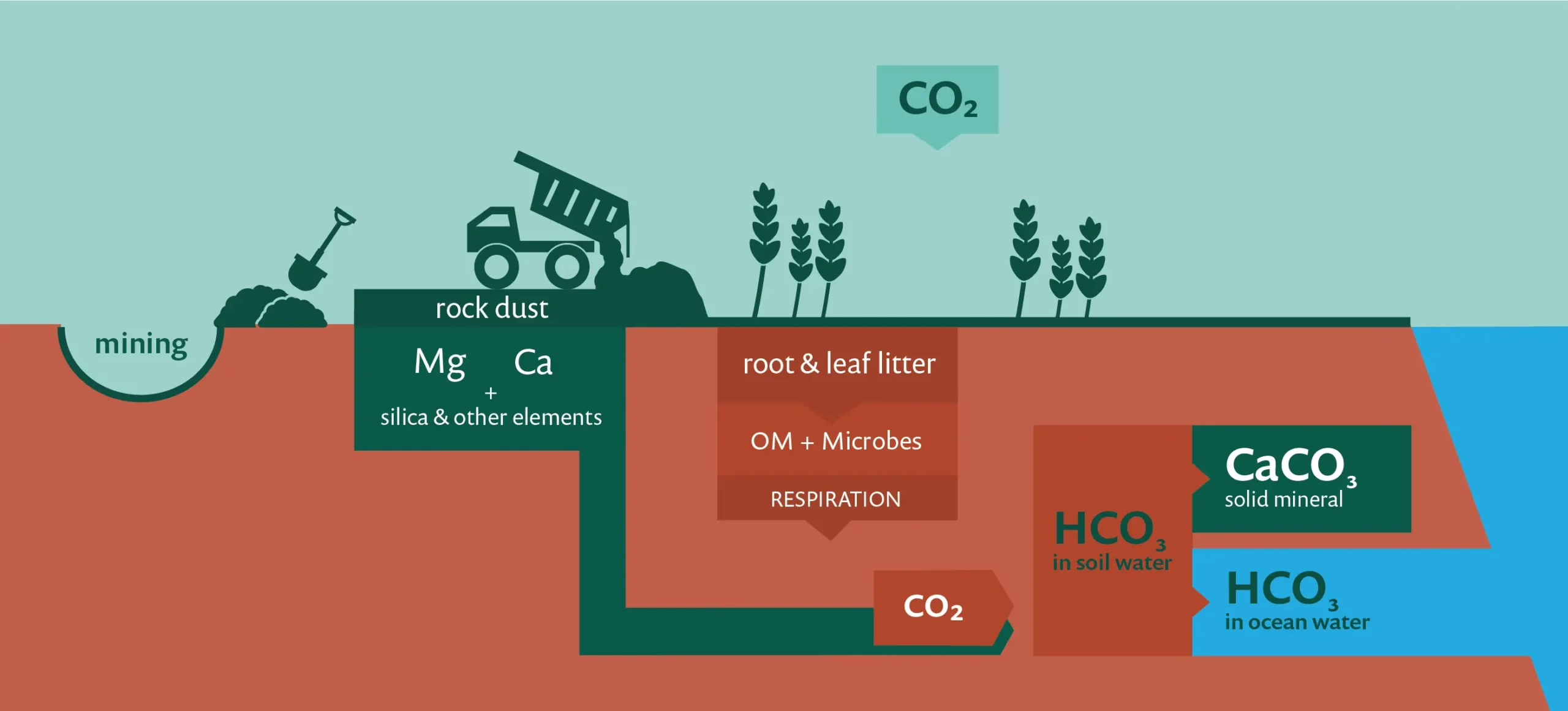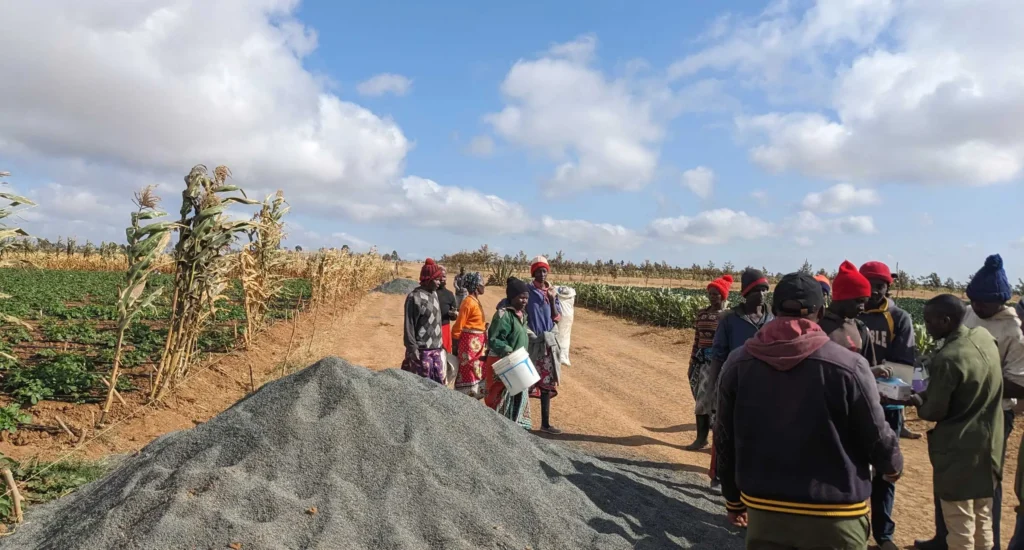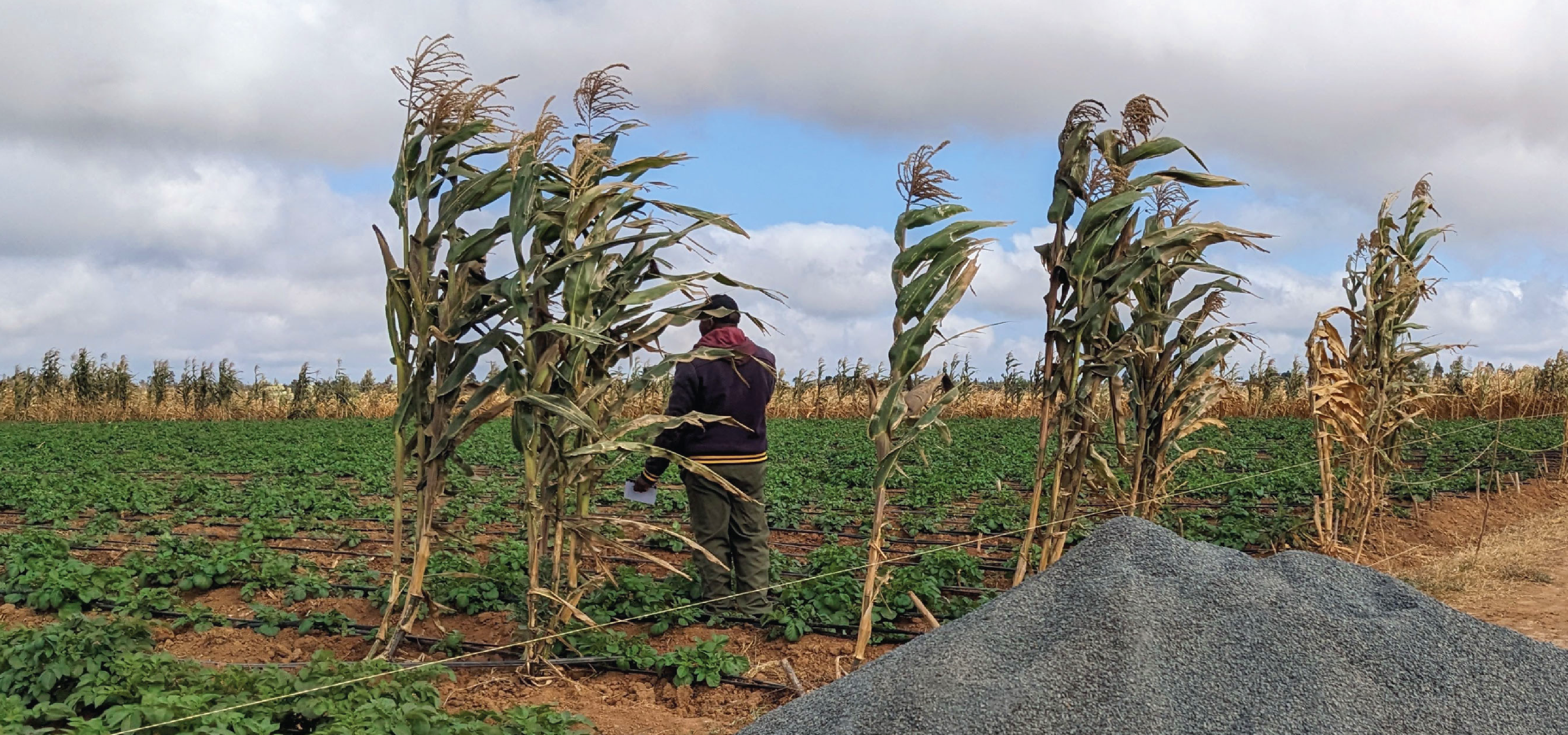- Impact
- Home
- Our Initiative
- Enhanced Rock Weathering for Carbon Removal
Enhanced Rock Weathering for Carbon Removal
Enhanced rock weathering (ERW) is a nature-based carbon dioxide removal (CDR) technology that can help mitigate climate change by permanently capturing and storing CO₂ from the atmosphere.

Overview
In the ERW process, finely ground rocks are applied to soils to accelerate natural chemical reactions which capture atmospheric carbon and convert it into stable dissolved forms. As a negative emissions technology, ERW not only contributes to the urgent global need for carbon removal – estimated at 1.5 GtCO₂eq per year to meet net zero goals (CDR Primer, 2021) – but also has the potential to provide agronomic benefits to farmers by improving soil health.
ERW is particularly well-suited for agricultural lands in the Global South due to favorable conditions for the weathering process, such as high temperatures, humidity, and suitable soils. Furthermore, emerging evidence suggests that the silicate rock powders used in ERW can significantly enhance agricultural productivity (Kelland et al., 2020; Beerling et al., 2024). In the Global South, where agriculture is a vital source of livelihood and yet many farming households live on less than $2 per day (CGAP, 2016), ERW offers benefits that extend beyond carbon removal. It has the potential to improve both environmental and socio-economic outcomes, making it an essential tool for empowering farmers in the face of climate change.
The Challenge: Building a Global South Inclusive Carbon Dioxide Removal Industry
While ERW holds great promise, the current industry is limited in size and scope, with only approximately 250,000 tonnes of carbon dioxide removal sold across all types of enhanced weathering projects to date (“CDR.fyi.”, n.d.). Notably, the majority of these projects are concentrated in the Global North.
Presently, investments in ERW are driven primarily by private sector firms participating in voluntary carbon markets. However, relying solely on commercial finance is unlikely to develop the ERW market at the scale needed, especially in the Global South, where critical issues such as equitable distribution and capacity building must also be addressed. Some of the key challenges emerging from the current ERW market are:
- Slow field learning and innovation
- Investment skewed towards high-income countries
- Investment is limited by the absence of common standards
- Insufficient attention to broader public objectives, such as social equity

Photo courtesy CAP-A Catalyzing the ERW Market: A Diverse Market Commitment Approach
ERW offers a unique opportunity to leverage innovative financing strategies that target both climate change and poverty alleviation goals. These dual benefits appeal to a diverse set of funders: those focused on climate impacts and those focused on socio-economic development. To catalyze the ERW market, we must bridge these two groups of funders, encouraging investments that support both objectives.
One promising strategy is an evolution of the Advanced Market Commitment (AMC) – what we have coined a “Diverse Market Commitment.” In this model, funders for climate and poverty alleviation work together to guarantee a future market for high-quality CDR products that meet environmental and equity standards, specifically for projects in the Global South. Through this approach, climate funders can support the development of the technology and infrastructure needed for ERW to scale. In contrast, poverty-alleviation funders can focus on ensuring the benefits are equitably distributed. This dual commitment has the potential to close the financing gap and drive sustainable growth in the ERW market.
PxD’s Role in Advancing ERW and Addressing Climate Change
At Precision Development (PxD), we are committed to advancing evidence-based climate change mitigation strategies for smallholder farmers in the Global South. As part of this effort, we are exploring how to scale ERW in credible, inclusive, and equitable ways. Through research and stakeholder engagement, we are actively shaping the conversation around ERW with a focus on its impact in the Global South.
Our work includes collaborating with an advisory group, engaging with stakeholders, and developing research papers and blogs to explore innovative solutions. If you are interested in learning more or sharing your thoughts, please contact us at info@precisiondev.org

Photo courtesy CAP-A
Downloads & Links
Make an Impact Today
Support our mission to empower farmers and scale sustainable innovations. We estimate that for every $1 invested in PxD’s services, we generate additional agricultural profits of $9 - $15. Your contribution can create lasting change for smallholder farmers worldwide.
 We use cookies to ensure that we give you the best experience on our website. If you continue to use this site we will assume that you are happy with it.Ok
We use cookies to ensure that we give you the best experience on our website. If you continue to use this site we will assume that you are happy with it.Ok